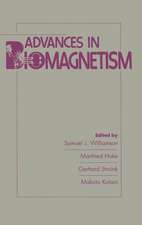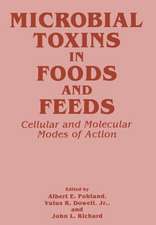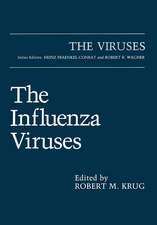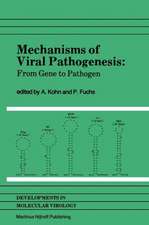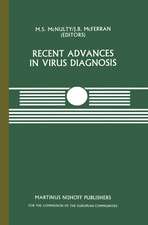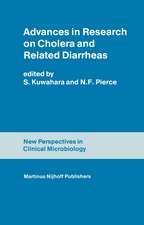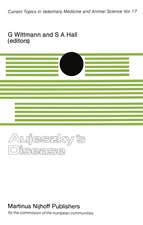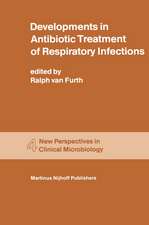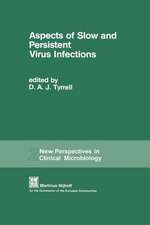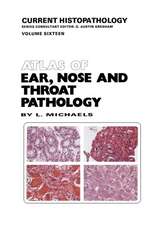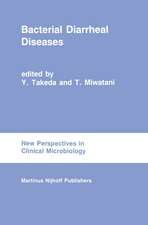Protein Misfolding and Disease: Methods in Molecular Biology, cartea 232
Editat de Peter Bross, Niels Gregersenen Limba Engleză Hardback – 20 iun 2003
| Toate formatele și edițiile | Preț | Express |
|---|---|---|
| Paperback (1) | 941.79 lei 43-57 zile | |
| Humana Press Inc. – 10 noi 2010 | 941.79 lei 43-57 zile | |
| Hardback (1) | 952.72 lei 43-57 zile | |
| Humana Press Inc. – 20 iun 2003 | 952.72 lei 43-57 zile |
Din seria Methods in Molecular Biology
- 9%
 Preț: 791.63 lei
Preț: 791.63 lei - 23%
 Preț: 598.58 lei
Preț: 598.58 lei - 20%
 Preț: 882.98 lei
Preț: 882.98 lei -
 Preț: 252.05 lei
Preț: 252.05 lei - 5%
 Preț: 802.70 lei
Preț: 802.70 lei - 5%
 Preț: 729.61 lei
Preț: 729.61 lei - 5%
 Preț: 731.43 lei
Preț: 731.43 lei - 5%
 Preț: 741.30 lei
Preț: 741.30 lei - 5%
 Preț: 747.16 lei
Preț: 747.16 lei - 15%
 Preț: 663.45 lei
Preț: 663.45 lei - 18%
 Preț: 1025.34 lei
Preț: 1025.34 lei - 5%
 Preț: 734.57 lei
Preț: 734.57 lei - 18%
 Preț: 914.20 lei
Preț: 914.20 lei - 15%
 Preț: 664.61 lei
Preț: 664.61 lei - 15%
 Preț: 654.12 lei
Preț: 654.12 lei - 18%
 Preț: 1414.74 lei
Preț: 1414.74 lei - 5%
 Preț: 742.60 lei
Preț: 742.60 lei - 20%
 Preț: 821.65 lei
Preț: 821.65 lei - 18%
 Preț: 972.30 lei
Preț: 972.30 lei - 15%
 Preț: 660.49 lei
Preț: 660.49 lei - 5%
 Preț: 738.41 lei
Preț: 738.41 lei - 18%
 Preț: 984.92 lei
Preț: 984.92 lei - 5%
 Preț: 733.29 lei
Preț: 733.29 lei -
 Preț: 392.60 lei
Preț: 392.60 lei - 5%
 Preț: 746.26 lei
Preț: 746.26 lei - 18%
 Preț: 962.66 lei
Preț: 962.66 lei - 23%
 Preț: 860.22 lei
Preț: 860.22 lei - 15%
 Preț: 652.64 lei
Preț: 652.64 lei - 5%
 Preț: 1055.50 lei
Preț: 1055.50 lei - 23%
 Preț: 883.87 lei
Preț: 883.87 lei - 19%
 Preț: 491.89 lei
Preț: 491.89 lei - 5%
 Preț: 1038.86 lei
Preț: 1038.86 lei - 5%
 Preț: 524.16 lei
Preț: 524.16 lei - 18%
 Preț: 2122.34 lei
Preț: 2122.34 lei - 5%
 Preț: 1299.23 lei
Preț: 1299.23 lei - 5%
 Preț: 1339.12 lei
Preț: 1339.12 lei - 18%
 Preț: 1390.26 lei
Preț: 1390.26 lei - 18%
 Preț: 1395.63 lei
Preț: 1395.63 lei - 18%
 Preț: 1129.65 lei
Preț: 1129.65 lei - 18%
 Preț: 1408.26 lei
Preț: 1408.26 lei - 18%
 Preț: 1124.92 lei
Preț: 1124.92 lei - 18%
 Preț: 966.27 lei
Preț: 966.27 lei - 5%
 Preț: 1299.99 lei
Preț: 1299.99 lei - 5%
 Preț: 1108.51 lei
Preț: 1108.51 lei - 5%
 Preț: 983.76 lei
Preț: 983.76 lei - 5%
 Preț: 728.16 lei
Preț: 728.16 lei - 18%
 Preț: 1118.62 lei
Preț: 1118.62 lei - 18%
 Preț: 955.25 lei
Preț: 955.25 lei - 5%
 Preț: 1035.62 lei
Preț: 1035.62 lei - 18%
 Preț: 1400.35 lei
Preț: 1400.35 lei
Preț: 952.72 lei
Preț vechi: 1161.85 lei
-18% Nou
Puncte Express: 1429
Preț estimativ în valută:
182.33€ • 189.65$ • 150.52£
182.33€ • 189.65$ • 150.52£
Carte tipărită la comandă
Livrare economică 14-28 aprilie
Preluare comenzi: 021 569.72.76
Specificații
ISBN-13: 9781588290656
ISBN-10: 1588290654
Pagini: 340
Ilustrații: XV, 318 p.
Dimensiuni: 155 x 235 x 24 mm
Greutate: 0.65 kg
Ediția:2003
Editura: Humana Press Inc.
Colecția Humana
Seria Methods in Molecular Biology
Locul publicării:Totowa, NJ, United States
ISBN-10: 1588290654
Pagini: 340
Ilustrații: XV, 318 p.
Dimensiuni: 155 x 235 x 24 mm
Greutate: 0.65 kg
Ediția:2003
Editura: Humana Press Inc.
Colecția Humana
Seria Methods in Molecular Biology
Locul publicării:Totowa, NJ, United States
Public țintă
Professional/practitionerCuprins
General Concepts and Models.- Protein Misfolding, Aggregation, and Degradation in Disease.- Basic Introduction to In Vivo Protein Folding and Its Defects.- Cystic Fibrosis.- ?1-Antitrypsin Deficiency.- Parkinson’s Disease.- Aberrant Protein Folding as the Molecular Basis of Cancer.- Yeast as a Model System to Investigate Protein Conformational Diseases.- General Methods.- Expression of Recombinant Proteins.- Expression in E. coli Systems.- Protein Expression in Yeasts.- Site-Directed Mutagenesis.- Pulse-Chase Labeling Techniques for the Analysis of Protein Maturation and Degradation.- Techniques in Conformational Disease Research.- Detection of Aggregates and Protein Inclusions by Staining of Tissues.- Study of Mutant Proteins With Folding Defects in Cultured Patient Cells.- E. coli Expression System for Identifying Folding Mutations of Human Adenosine Deaminase.- Characterization of Overexpressed Mutant Proteins in Mammalian Cells.- Investigation of Unfolded-Protein Response in Cells Expressing Familial Alzheimer's Disease-Linked Presenilin Variants.- Huntingtin Fragments Form Aggresome-Like Inclusion Bodies in Mammalian Cells.- Application of Chemical Chaperones to the Rescue of Folding Defects.- Analysis of Defective Subunit Interactions Using the Two-Hybrid System.- Investigation of Folding and Degradation of In Vitro Synthesized Mutant Proteins in the Cytosol.- Investigation of Folding and Degradation of In Vitro Synthesized Mutant Proteins in Microsomes.- Investigation of Folding and Degradation of In Vitro Synthesized Mutant Proteins in Mitochondria.- Investigation of Folding and Degradation of Mutant Proteins Synthesized in Semipermeabilized Cells.
Recenzii
"...a very sound book that provides a solid background in conformational disease and presents the reader with helpful experimental protocols for studying protein folding folding and misfolding." - Pharmaceutical Research
"...this book will be a very useful took for specialists in protein chemistry, molecular biology and basic medicine, and also for teachers and their students studying principles of proteomics." Biochemistry
"...this book will be a very useful took for specialists in protein chemistry, molecular biology and basic medicine, and also for teachers and their students studying principles of proteomics." Biochemistry
Textul de pe ultima copertă
It has now become clear that a large number of diseases with very different pathologies share a common framework of protein misfolding, accompanied by degradation and/or aggregation of the misfolded proteins. In Protein Misfolding and Disease: Principles and Protocols, notable experts in conformational disease review the latest thinking about the molecular processes underlying these diseases and describe cutting-edge biochemical, genomic, cellular, and chemical laboratory techniques for studying their genesis and pathologies. The authors apply their carefully refined methods to a variety of metabolic and neurodegenerative disorders, as well as to the aging process. The techniques presented are broadly applicable in many diverse disease contexts and may be used in both diagnosis and detailed research on new treatment strategies. Each tried and proven protocol includes insightful background notes, lists of required equipment and reagents, step-by-step instructions, and tips on troubleshooting and on how to avoid known pitfalls.
Comprehensive and cutting-edge, Protein Misfolding and Disease: Principles and Protocols offers both novice and experienced researchers a solid theoretical grounding in conformational disease and a remarkable set of analytical methodologies for uncovering its characteristics and generating new therapeutic approaches.
Comprehensive and cutting-edge, Protein Misfolding and Disease: Principles and Protocols offers both novice and experienced researchers a solid theoretical grounding in conformational disease and a remarkable set of analytical methodologies for uncovering its characteristics and generating new therapeutic approaches.
Caracteristici
Includes supplementary material: sn.pub/extras







